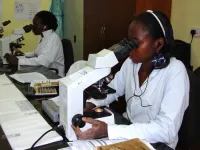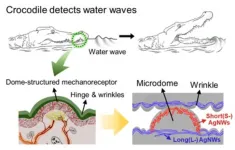(Press-News.org) Bacteria are literally everywhere – in oceans, in soils, in extreme environments like hot springs, and even alongside and inside other organisms including humans. They’re nearly invisible, yet they play a big role in almost every facet of life on Earth.
Despite their abundance, surprisingly little is known about many microorganisms that have existed for billions of years.
This includes an entire lineage of nano-sized bacteria dubbed Omnitrophota. These bacteria, first discovered based on short fragments of DNA just 25 years ago, are common in many environments around the world but have been poorly understood. Until now.
An international research team produced the first large-scale analysis of more than 400 newly sequenced and existing Omnitrophota genomes, uncovering new details about their biology and behavior. The team’s findings are reported in the March 16 issue of the journal Nature Microbiology.
“We now have the most comprehensive view to date of the biology of an entire phylum of microorganisms and the surprising role they play in the Earth’s ecosystems,” said UNLV microbiologist Brian Hedlund, the study’s corresponding author. “There is a finite number of major lineages of life on our planet, and it’s exciting to learn more about organisms that pre-date plants and animals and have been essentially hidden under our noses.”
The tricky thing with Omnitrophota is that they’re still largely considered microbial dark matter, which means they exist in nature but can’t yet be cultivated as single species in lab studies. Just two species have been microscopically observed, and only very recently.
To present a comprehensive picture of their biology, scientists compared 349 existing and 72 newly mapped genomes of Omnitrophota. This included a review of publicly available data and new samples collected from geothermal environments, freshwater lakes, wastewater, groundwater, and springs located around the world.
The team observed that, in most cases, Omnitrophota measure less than 450 nanometers, which places them among the smallest of all known organisms. They also displayed genetic markers consistent with symbiosis - possibly as predators or parasites of other microorganisms, which suggested they would have high metabolic rates. Indeed, when isotope uptake was measured as a proxy for metabolic activity, Omnitrophota were hyperactive.
“Despite how little we collectively knew about Omnitrophota, they’ve long been cited by microbial ecologists. Our goal was to finally drag this lineage out of the dark,” said Cale Seymour, a recent UNLV master’s graduate and the study’s lead author. “The more we learn about their energy conservation pathways and possible lifestyles, the closer we get to our goal of cultivating them in the lab and bringing them into the light.”
The study, “Hyperactive nanobacteria with host-dependent traits pervade Omnitrophota,” appeared March 16 in the journal Nature Microbiology. Additional collaborating organizations include Bigelow Laboratory for Ocean Sciences, the University of North Alabama, the U.S. Department of Energy Joint Genome Institute, Desert Research Institute, Northern Arizona University, Sun Yat-sen University, University of Science and Technology of China, and University of Queensland.
END
Study shines new light on ancient microbial dark matter
In latest issue of Nature Microbiology, international research team reveals first in-depth look at Omnitrophota -- one of the world’s oldest and tiniest bacteria.
2023-03-17
ELSE PRESS RELEASES FROM THIS DATE:
An age-old battle: Scientists uncover what makes malaria such a wily foe
2023-03-17
Plasmodium falciparum, the parasite that causes the deadliest form of malaria in humans, is a master evader, and has dodged all attempts at an effective and durable vaccine. Now, using a sophisticated method that characterizes how antibodies respond to all of the parasite’s roughly 5,400 proteins, researchers at Chan Zuckerberg Biohub–San Francisco (CZ Biohub SF) and UC San Francisco (UCSF) have created the first high-resolution map of the human immune response to P. falciparum, offering insight into what makes this parasite such a persistent pathogen.
In a study published in eLife ...
Study reveals your loveable pet dog or cat could lead to restless nights
2023-03-17
A new study published in the CABI journal Human-Animal Interactions reveals that your lovable pet dog or cat may lead to you having more restless nights than those graced with long periods of peaceful sleep.
The research, led by Dr Lauren Wisnieski of Lincoln Memorial University, USA, focussed specifically on pet ownership in the USA and drew upon data from the National Health and Nutrition Examination Survey (NHANES) conducted in 2005-2006.
Dr Wisnieski, Assistant Professor of Public Health and Research and Affiliation, found that ...
AADOCR announces IADR/AADOCR Journal of Dental Research “Cover of the Year, 2022”
2023-03-17
Alexandria, VA, USA – The American Association for Dental, Oral and Craniofacial Research (AADOCR) has announced the IADR/AADOCR Journal of Dental Research (JDR) Cover of the Year, 2022 for the paper, “MUC1 and Polarity Markers INADL and SCRIB Identify Salivary Ductal Cells.” The winners were recognized during the Opening Ceremonies of the 52nd Annual Meeting of the AADOCR, held in conjunction with the 47th Annual Meeting of the Canadian Association for Dental Research (CADR), that took place on March 15, 2023.
In this study, authors D. Wu, P.J. Chapela, C.M.L. Barrows, D.A. Harrington, D.D. Carson, R.L. Witt, N.G. Mohyuddin, S. Pradhan-Bhatt, and ...
Astha Singhal, Cameron Randall and Tamanna Tiwari, named first recipients of the AADOCR Delta Dental Institute Oral Health Equity Research Award
2023-03-17
Alexandria, VA – The American Association for Dental, Oral, and Craniofacial Research has named Astha Singhal, Boston University, MA, and the team of Cameron Randall, University of Washington, Seattle, and Tamanna Tiwari, University of Colorado, Aurora the inaugural recipients of the AADOCR Delta Dental Institute Oral Health Equity Research Award.
Established for this year with generous support from the Delta Dental Institute, the Oral Health Equity Research Award supports two research awards of $25,000 each in the areas of 1) advancing recommendations for greater oral health equity in populations that lack access to dental ...
THE LANCET PUBLIC HEALTH: Elite football players are more likely to develop dementia, suggests Swedish study
2023-03-17
Peer-reviewed / Observational study / People
New study including 6,007 male football (soccer) players who played in the Swedish top division between 1924 to 2019 suggests they were 1.5 times more likely to develop neurodegenerative disease compared to population controls.
Elite football players had increased risk of developing Alzheimer’s disease and other dementias, but their risk was not increased for motor neuron disease (including ALS), and their risk of Parkinson’s disease was lower compared to controls.
Unlike outfield ...
An extra X chromosome-linked gene may explain decreased viral infection severity in females
2023-03-17
It has long been known that viral infections can be more severe in males than females, but the question as to why has remained a mystery – until possibly now. The key may lie in an epigenetic regulator that boosts the activity of specialized anti-viral immune cells known as natural killer (NK) cells.
In a study published March 16 in the peer-reviewed journal Nature Immunology, a collaborative team of UCLA researchers have found that female mouse and human NK cells have an extra copy of an X chromosome-linked gene called UTX. UTX acts as an epigenetic regulator to boost NK cell ...
Leaders with low self-esteem are likely to cause ‘toxic’ stress at work, research shows
2023-03-17
There is a mountain of evidence to show that stress is a leading cause of common and lethal diseases, including heart attacks, diabetes, asthma, cancer, osteoporosis, anxiety, depression, insomnia, memory loss and premature aging.
But how much of a role does ‘toxic’ leadership play in workplace stress, and what are the signs of a toxic leader?
Recent data has shown that three-fifths of the world’s employees say their job impacts their mental health more than anything else.
Backed up by 40 years of research, wellbeing expert Professor Simon L. Dolan PhD says that leaders ...
Study highlights challenges facing transgender and non-binary workers
2023-03-17
New research led by the University of East Anglia (UEA) highlights some of the challenges that transgender and non-binary staff can face at work.
The study also shows how their experiences can help us to see ways in which the working context might be changed to create a more inclusive environment that is receptive to more diverse gender identities.
For example, through the provision of non-gendered changing and bathroom spaces, and processes that enable people to complete forms and choose pronouns in line with their identity.
While there are various examples of good practice and initiatives to ...
Electronic skin as flexible as crocodile skin
2023-03-17
The development of electronic skin with multiple senses is essential for various fields, including rehabilitation, healthcare, prosthetic limbs, and robotics. One of the key components of this technology is stretchable pressure sensors, which can detect various types of touch and pressure. Recently, a joint team of researchers from POSTECH and the University of Ulsan in Korea has recently made a significant breakthrough by successfully creating omnidirectionally stretchable pressure sensors inspired by crocodile skin.
The team behind the research was led by Professor Kilwon Cho, Dr. Giwon Lee, and Dr. Jonghyun Son from ...
Disproportionate percentage of females with unexplained infertility have gene variants known to cause heart problems, cancer
2023-03-17
AUGUSTA, Ga. (March 17, 2023) – About 17% of women with unexplained infertility also have gene variants known to cause disease, from common conditions like heart disease to rare problems like ALS, Medical College of Georgia researchers report.
Theirs appears to be the first study to identify an increased prevalence of disease-causing genetic variants in females with unexplained infertility, the team, led by Lawrence C. Layman, MD, reports in the New England Journal of Medicine.
They hypothesized that genetic disease creates a predisposition to infertility and subsequent medical ...
LAST 30 PRESS RELEASES:
Chimps’ love for crystals could help us understand our own ancestors’ fascination with these stones
Vaginal estrogen therapy not linked to cancer recurrence in survivors of endometrial cancer
How estrogen helps protect women from high blood pressure
Breaking the efficiency barrier: Researchers propose multi-stage solar system to harness the full spectrum
A new name, a new beginning: Building a green energy future together
From algorithms to atoms: How artificial intelligence is accelerating the discovery of next-generation energy materials
Loneliness linked to fear of embarrassment: teen research
New MOH–NUS Fellowship launched to strengthen everyday ethics in Singapore’s healthcare sector
Sungkyunkwan University researchers develop next-generation transparent electrode without rare metal indium
What's going on inside quantum computers?: New method simplifies process tomography
This ancient plant-eater had a twisted jaw and sideways-facing teeth
Jackdaw chicks listen to adults to learn about predators
Toxic algal bloom has taken a heavy toll on mental health
Beyond silicon: SKKU team presents Indium Selenide roadmap for ultra-low-power AI and quantum computing
Sugar comforts newborn babies during painful procedures
Pollen exposure linked to poorer exam results taken at the end of secondary school
7 hours 18 mins may be optimal sleep length for avoiding type 2 diabetes precursor
Around 6 deaths a year linked to clubbing in the UK
Children’s development set back years by Covid lockdowns, study reveals
Four decades of data give unique insight into the Sun’s inner life
Urban trees can absorb more CO₂ than cars emit during summer
Fund for Science and Technology awards $15 million to Scripps Oceanography
New NIH grant advances Lupus protein research
New farm-scale biochar system could cut agricultural emissions by 75 percent while removing carbon from the atmosphere
From herbal waste to high performance clean water material: Turning traditional medicine residues into powerful biochar
New sulfur-iron biochar shows powerful ability to lock up arsenic and cadmium in contaminated soils
AI-driven chart review accurately identifies potential rare disease trial participants in new study
Paleontologist Stephen Chester and colleagues reveal new clues about early primate evolution
UF research finds a gentler way to treat aggressive gum disease
Strong alcohol policy could reduce cancer in Canada
[Press-News.org] Study shines new light on ancient microbial dark matterIn latest issue of Nature Microbiology, international research team reveals first in-depth look at Omnitrophota -- one of the world’s oldest and tiniest bacteria.


